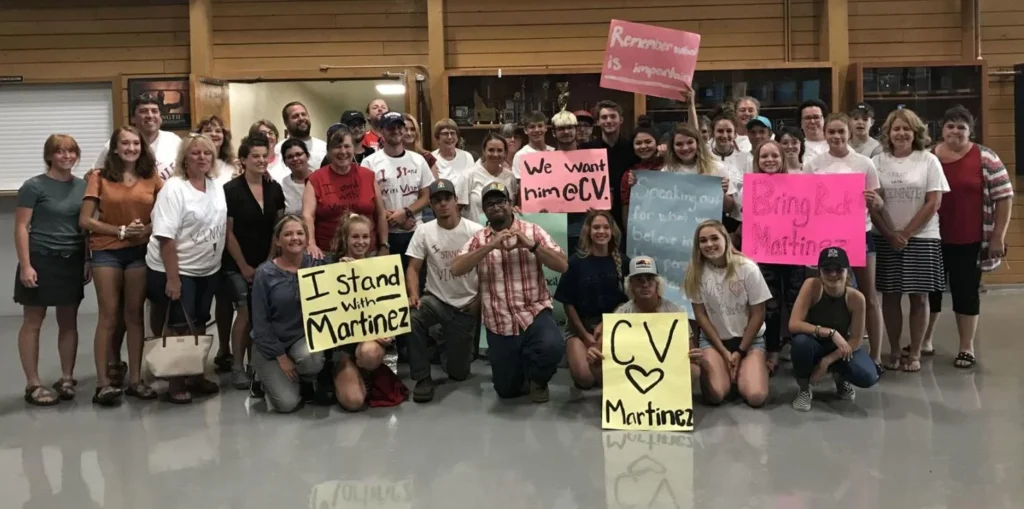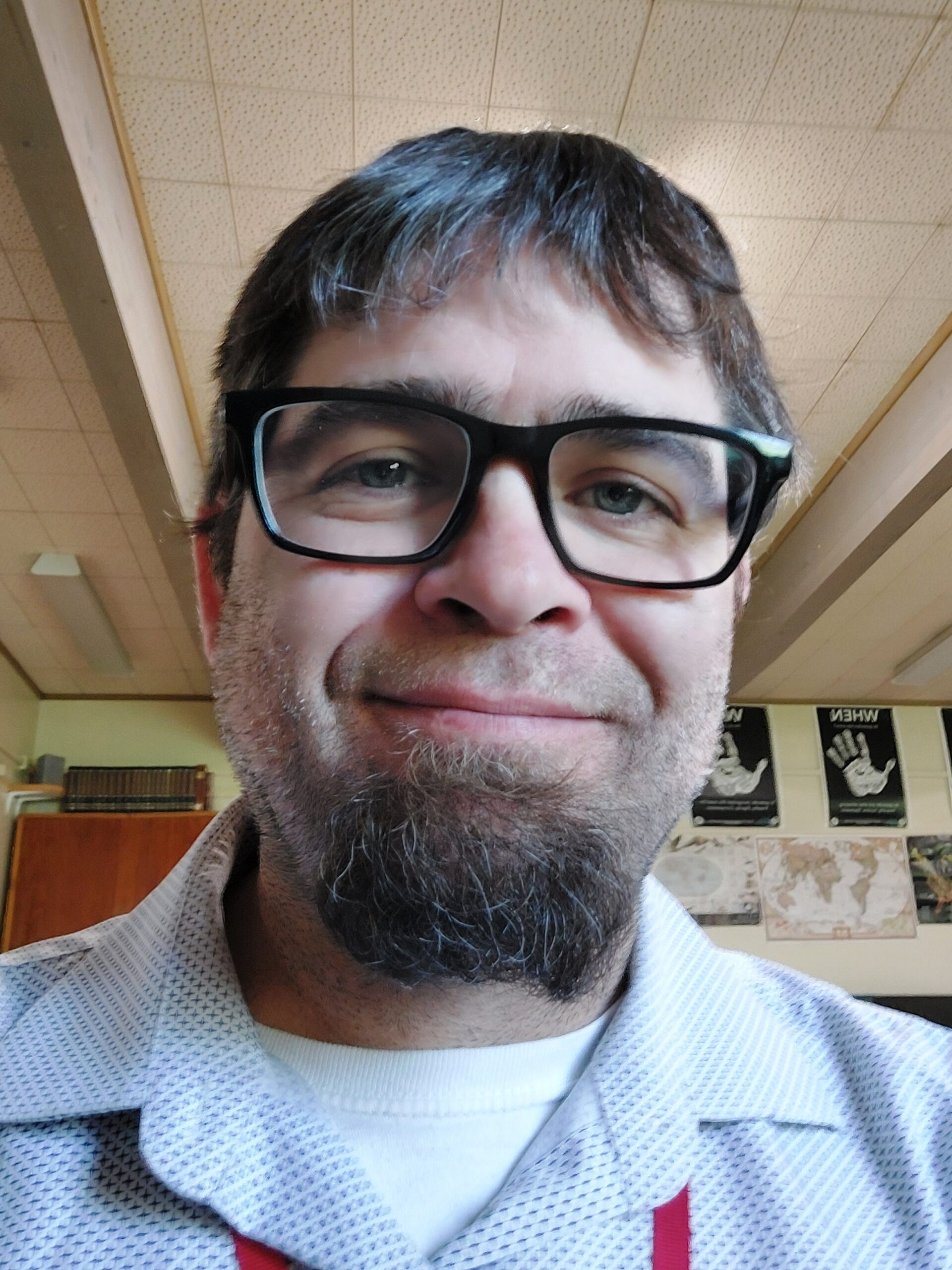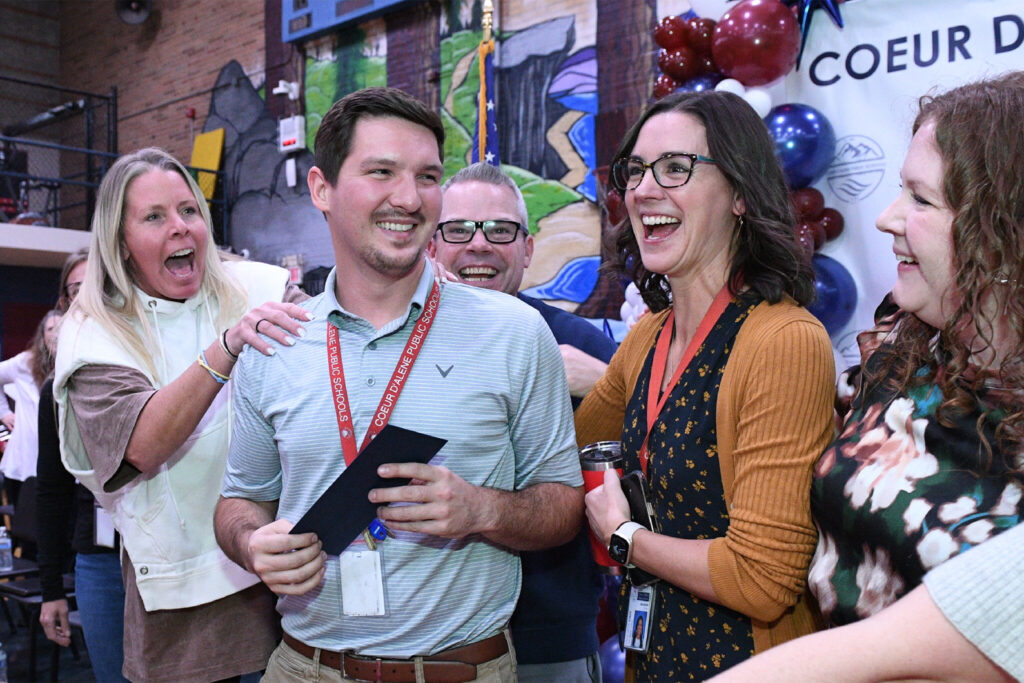Vinnie Martinez kicked off sixth grade with six fights.
He was the new guy in small-town Kooskia, a 77-pound kid with a white mom and a Puerto Rican dad. “If you didn’t fit the mold at that time, you were kind of shunned,” he said.
His classmates began testing him immediately. “I got two kids every recess before I showed them that I could hold my own and that I was not to just be picked out because I was the new kid in town,” he said.
That fighting spirit has never left Martinez. Every step of the way, he has faced tragedy and personal attacks that would send most people packing. But he has also received support from those who recognized his natural leadership, including teachers, his wife and his union.
Now, as principal of the same high school he attended as a student, he has the chance to lift up kids just like him.
“I often sit in my office and look around and giggle with others and to myself — like, ‘Man, I was in this office so much,’” he laughs. “You never know where you’re going to end up, really.”
‘Why Don’t You Put Your Money Where Your Mouth Is?’
Where Martinez would end up was a frequent question during his childhood. Before landing in Kooskia, he was a student in Grangeville and Olympia, Wash. After his parents divorced when he was in fifth grade, his mom began a new relationship that brought Martinez to Kooskia.
Martinez began to settle into small-town life after that rough first day. But when his mom was killed in a car accident during his sophomore year at Clearwater Valley High School, his family home split up. Martinez stayed in Kooskia, taken in by friends so he could finish school there.
That low point was the start of something big for Martinez. He was struggling, but his teachers saw something in him that he couldn’t quite see himself — yet. His government teacher, Dick Adams, viewed him as a leader off and on the field, helping Martinez and his fellow teammates petition the school district to offer baseball. His baseball coach and art teacher, Greg Lewis, encouraged him to embrace his natural talents. And Cheryl Tousley, his English teacher, nurtured his burgeoning leadership skills.
“After my mom died my sophomore year, she kept planting the seed and watering it,” he said. “That people believe in me and look for me to be kind and compassionate, because I’ve always had that in me. I never really was angry or aggressive, just kind of self-destructive.”
There were more educators who believed in him, he said, and over the years he has been able to keep in touch with many of them. “I do let them know how meaningful they were then, and now, to me,” he said.
But it was another new kid in town who drastically changed his life. His future wife, Elizabeth, arrived in Kooskia as a freshman. He met her in art class and was smitten.
“I did ask her to the homecoming dance, and she denied me three times,” he said, recalling how she insisted he wasn’t serious. She was a freshman and he was a senior. They finally began dating when she was a senior and he was washing dishes and working in grocery stores to make ends meet.
Elizabeth had her sights set on college. The young couple moved to Boise so she could attend Boise State University for her nursing degree while Martinez worked construction and window glazing. He helped Elizabeth study for her tests so much that “I kind of felt like I was getting a nursing degree when I wasn’t,” he said.
One night, tired and exasperated by another request to quiz Elizabeth, Martinez snapped. “I said, ‘Come on, man. This is ridiculous. Can’t you just remember this stuff?”
Her response changed his life: “Well, if you’re so smart, why don’t you go to college? Why don’t you put your money where your mouth is?”
Years later, he’s still impressed by the nearly instant change her words caused in him.
“She doesn’t like me to tell these stories all the time because she thinks they’re negative in connotation,” he said. “But she doesn’t realize they’re actually blessings in disguise.”
Martinez hadn’t valued grades very much as a student and was rejected by the state’s large institutions. But Lewis-Clark State College accepted him. He moved to Lewiston while Elizabeth finished her studies in Boise; he eventually earned two degrees in four years, sometimes taking up to 28 credits per semester.
The Long Road to Education
The path to teaching, like so much in his life, was not straightforward. Unable to find a teaching job in his old school district, he became a certified paraprofessional educator — and still the jobs didn’t materialize. Short on cash, he went to work in forestry while applying for teaching jobs.
He and his boss were not a good match, though, and Martinez disapproved of his business practices so much that he went to pawn shop, bought a chainsaw, and started his own competing forestry business. Even as it grew to 15 employees, Martinez still longed to teach. The path forward, he and Elizabeth decided, ran through his paraprofessional certificate. “These people will never know what caliber of teacher I am if I never get the shot,” he remembers thinking.
He took a job in Grangeville and held the hope that he’d be able to teach in his old district one day. A chance meeting at the hospital where his wife worked gave him the opportunity he needed: the administrative assistant at Clearwater Valley High School happened to be visiting and encouraged Martinez to apply for a position teaching business technology. He got the job.
He also got a union. Martinez became a member of the Central Idaho Education Association and joined IEA’s SPARKS program for early career educators and CIEA’s bargaining team. In the midst of bruising negotiations, he tried correcting the board’s math during a chaotic meeting. He giggled in another meeting. Soon, two letters of reprimand for interrupting negotiating meetings arrived, and Martinez wasn’t rehired.

When news spread that the beloved Mr. Martinez wouldn’t return for the next school year, the backlash against the school board was swift and vocal. Students, parents and Martinez’s fellow educators and union members flooded the Mountain View School District board meeting. But the board was unmoved, even as tearful students insisted they were making the wrong decision. Martinez was banned from the building where he went to school, where he taught and where his daughters went to classes.
“It was 100 percent because of my involvement with the negotiating team,” he said.
That was in 2019. In 2020, with help from Idaho Education Association Region Director Jason McKinley and IEA’s attorneys, the Central Idaho Education Association filed a wrongful termination suit — and won.
“It was because of the union that I’m back in the building,” he said.
That’s the power of a union, Martinez said. “At the end of the day, they’ll fight for you,” Martinez said. Union membership was “basically a no-brainer, and has always been a no-brainer for me,” he said.
Light at the End of the Tunnel
Good did come out of Martinez’s struggle with the school board. “The community response between failed levies and me not being rehired was just out the roof, bringing people out of the woodwork to really chastise the board,” he said.
Thanks in large part to community pressure, the school board members who ousted Martinez are no longer serving on the board — and Martinez was inspired to add to his ever-growing list of degrees and certifications by earning his principalship credentials.
Just a few years later, he was the principal of his alma mater. And he never once thought of ending his union membership because of his new position.
“To me, it was a matter of integrity,” he said. “I believe in this. It has benefits to it. So I had to reach out and ask the question: Can I be a union member? When I was told yes, it was, ‘OK, sign me up, change my status, please bill me accordingly.’ ”
Now, years after arriving in Kooskia as a sixth grader, he has big plans for his former high school. He has come full circle, helping students in the same room where he was often called on the carpet. But all of that has been part of the process.
“I believe in the long run versus the short run,” he said. “And in the short run, it’s hard, brow-beating, emotional. But in the long run it’s rewarding and there is light at the end of the tunnel. It just takes some days of darkness to get there.”

